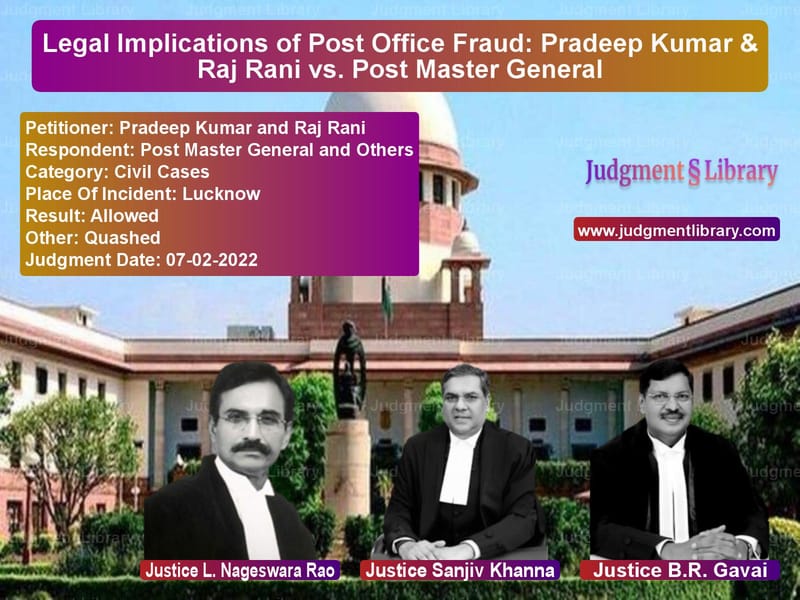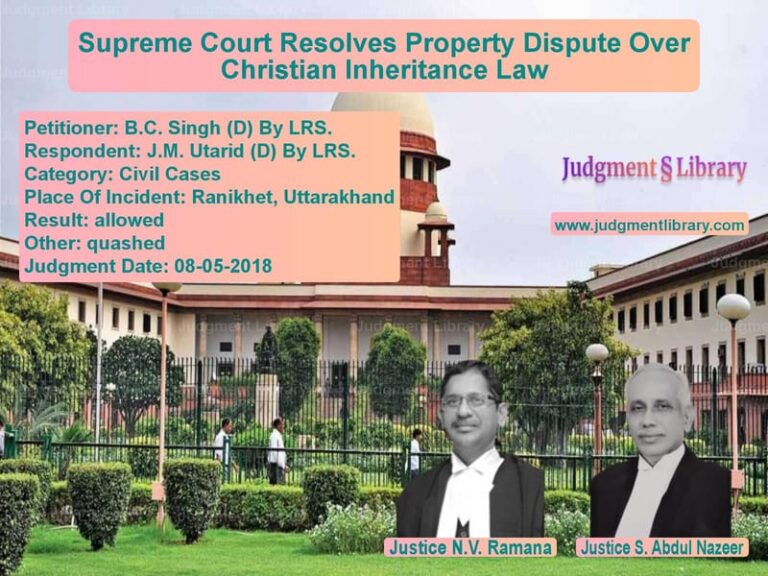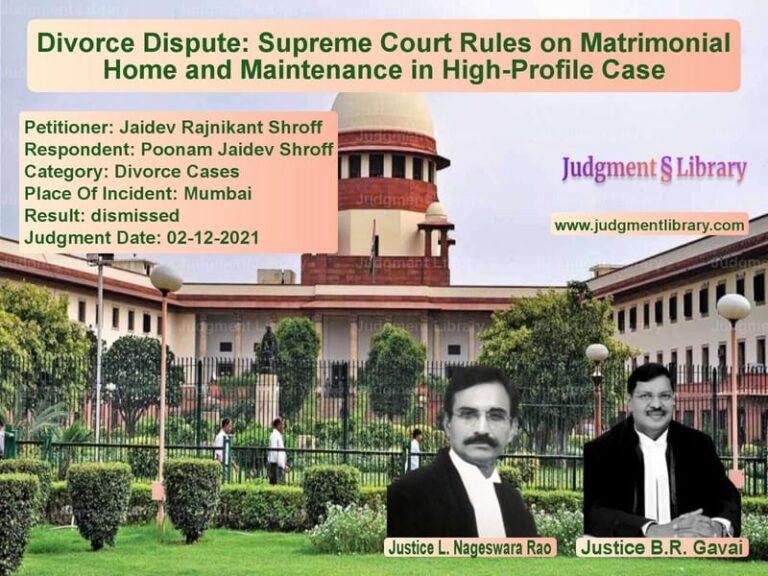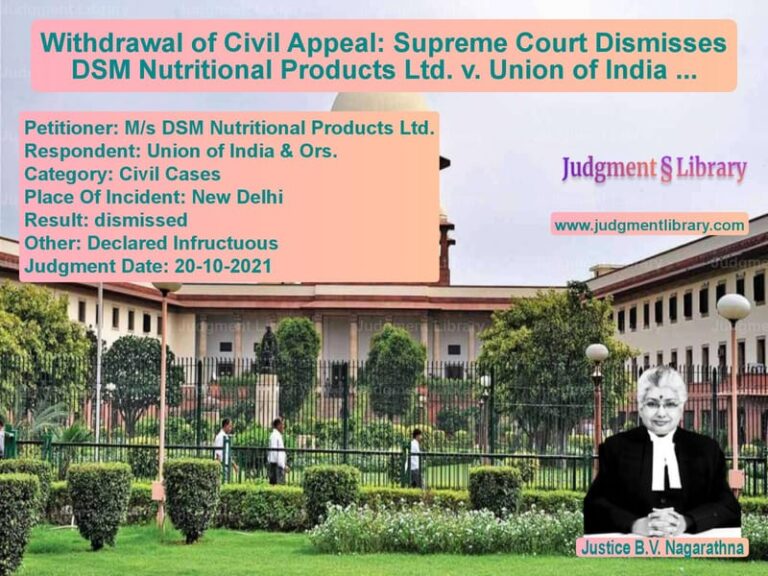Legal Implications of Post Office Fraud: Pradeep Kumar & Raj Rani vs. Post Master General
The case of Pradeep Kumar and Another vs. Post Master General and Others revolves around the fraudulent encashment of Kisan Vikas Patras (KVPs) by an agent, Rukhsana, appointed by the State of Uttar Pradesh. The appellants, Pradeep Kumar and Raj Rani, had purchased these KVPs in joint names from various post offices in Uttar Pradesh, with the total face value maturing at Rs. 32.6 lacs. However, the KVPs were fraudulently encashed by Rukhsana, a self-appointed agent of the post office, without the appellants’ knowledge and consent. This led to legal proceedings and a complaint filed by the appellants under the Consumer Protection Act, 1986, seeking redress for the financial loss caused by the fraudulent encashment of the KVPs.
Background of the Case
The appellants, in 1995 and 1996, had invested in KVPs with varying dates of maturity and denominations. In 2000, they approached the Post Master at the Head Post Office Chowk in Lucknow with a request to transfer their KVPs to a different post office. They were informed that they would need to apply to the Chowk Post Office, but were advised to seek the help of an agent, Rukhsana, due to the time-consuming nature of the process. The appellants, trusting Rukhsana, handed over their signed KVPs and Monthly Income Scheme (MIS) passbook for the transfer. Rukhsana, however, encashed the KVPs at the Yahiyaganj and Lal Bagh post offices, stealing the proceeds amounting to Rs. 25.54 lakhs.
The appellants were unaware of the fraudulent act until they were contacted by the police in June 2000, who informed them that Rukhsana had been arrested for similar frauds. The appellants later learned that the KVPs had been encashed with the involvement of M.K. Singh, the Sub-Post Master of the Yahiyaganj post office. The KVPs were paid out in cash, which violated the rules governing such transactions.
The appellants filed a complaint with the National Consumer Disputes Redressal Commission (NCDRC) seeking compensation for the financial loss, interest on the amount, and damages for the mental distress caused. The respondents, including the post office authorities, argued that the appellants had signed the KVPs and had willingly handed them over to Rukhsana. They denied any negligence or responsibility for the fraudulent encashment.
Petitioner’s Arguments
The appellants made the following arguments in their favor:
- The KVPs were issued in their names, and they had signed them only in the presence of the post office authorities for the purpose of transferring them. They did not authorize Rukhsana to encash the KVPs.
- The respondents had failed to follow proper procedures when encashing the KVPs, especially the requirement of payment through cheque when the amount exceeded Rs. 20,000, as stipulated by the Post Office Savings Bank Manual and Ministry of Finance guidelines.
- The respondents had not verified Rukhsana’s authority to encash the KVPs, and there was negligence in failing to ensure that the KVPs were only encashed to the rightful owner.
- The appellants had been misled into believing that Rukhsana, as an agent of the post office, would handle the transfer of the KVPs properly, and they were not informed of the risks involved.
Respondent’s Arguments
The respondents, including the post office authorities and M.K. Singh, made the following counterarguments:
- The appellants had willingly signed and handed over the KVPs to Rukhsana, and they were fully aware of the process involved in transferring and encashing the KVPs.
- Rukhsana was not an authorized agent of the post office, and the transaction was between the appellants and Rukhsana. The post office authorities were not vicariously liable for her actions.
- The encashment of the KVPs had been made according to the rules in force at the time, and the respondents had no knowledge of any fraudulent activities.
- M.K. Singh, the Sub-Post Master, was acting within the scope of his duties, and there was no breach of rules in paying out the maturity amount to Rukhsana.
Supreme Court’s Observations
The Supreme Court, in its review of the case, focused on several key points:
- The KVPs, as per the Post Office Savings Scheme, are considered negotiable instruments, and the rules surrounding their encashment are binding on the post office.
- The Court examined whether the post office authorities had followed the due process under the 1988 KVP Rules, which mandate that payment of KVPs exceeding Rs. 20,000 should be made through cheque and not in cash.
- The Court emphasized that the post office authorities were responsible for verifying the identity and authority of the person presenting the KVPs for encashment, and the failure to do so constituted negligence on their part.
- The actions of M.K. Singh, the Sub-Post Master, who had facilitated the fraudulent encashment, were within the course of his employment, making the post office vicariously liable for his actions.
Final Judgment
The Supreme Court ruled in favor of the appellants and allowed their appeals. The Court held that the post office authorities were liable for the fraudulent encashment of the KVPs, as they had failed to follow the required procedures and had allowed payment to be made to an unauthorized person, Rukhsana. The Court also held that:
- The appellants were entitled to receive the maturity value of the KVPs, along with interest at 7% per annum from the date of the encashment.
- The appellants were awarded compensation of Rs. 1,00,000 for the mental distress caused by the fraud, and Rs. 10,000 for litigation expenses.
- If the respondents failed to make the payment within eight weeks, they would be liable to pay additional interest at 7% per annum on the compensation amount.
Implications of the Judgment
This judgment has significant implications for consumer rights, particularly in cases involving fraud and negligence by public service entities like the post office. The Court’s ruling emphasizes the need for:
- Strict adherence to procedural guidelines when handling financial instruments such as KVPs.
- The liability of public authorities for actions of their employees, especially in cases of fraud and negligence.
- The rights of consumers to seek redress when they are victims of fraud, even when third parties are involved.
Conclusion
The Supreme Court’s ruling in the case of Pradeep Kumar & Raj Rani vs. Post Master General and Others reinforces the importance of following due process in public service transactions and holds public authorities accountable for the actions of their employees. The judgment ensures that consumers are protected from fraud and negligence and affirms the principle that public service entities must exercise due care when handling financial matters on behalf of the public.
Petitioner Name: Pradeep Kumar and Raj Rani.Respondent Name: Post Master General and Others.Judgment By: Justice L. Nageswara Rao, Justice Sanjiv Khanna, Justice B.R. Gavai.Place Of Incident: Lucknow.Judgment Date: 07-02-2022.
Don’t miss out on the full details! Download the complete judgment in PDF format below and gain valuable insights instantly!
Download Judgment: pradeep-kumar-and-ra-vs-post-master-general-supreme-court-of-india-judgment-dated-07-02-2022.pdf
Directly Download Judgment: Directly download this Judgment
See all petitions in Consumer Rights
See all petitions in Debt Recovery
See all petitions in Fraud and Forgery
See all petitions in Judgment by L. Nageswara Rao
See all petitions in Judgment by Sanjiv Khanna
See all petitions in Judgment by B R Gavai
See all petitions in allowed
See all petitions in Quashed
See all petitions in supreme court of India judgments February 2022
See all petitions in 2022 judgments
See all posts in Civil Cases Category
See all allowed petitions in Civil Cases Category
See all Dismissed petitions in Civil Cases Category
See all partially allowed petitions in Civil Cases Category







